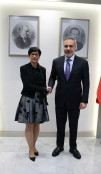Women Entrepreneurs Shaping Rural Tourism in Cappadocia

“Could I do it? Would guests come? Could I manage everything?” Today, her boutique hotel in Cappadocia welcomes visitors from around the world. She describes the arrival of her first guests, four Italians, as “a mix of pride, excitement and relief”.
Tuğba, the mother of two, was inspired to take her first steps towards starting her own business after hearing that another woman at work had received support through IPARD, the EU-funded rural development programme.
Tuğba remembers thinking, “If she can do it, I can do it too,” adding: “That was my motivation.”
With her husband’s support, she applied for IPARD funding in 2022 and achieved a perfect score of 90 points for her project. By late 2023, her hotel had opened, blending Cappadocia’s traditional stonework with modern comforts. Today, she employs five people, including two women. “We want our guests to be happy, but we also want to provide opportunities for young people and women in the region,” she explains.

European Union, 2025
Mehtap Canitez works for her employer, Tuğba Bilen.
Workplace that feels like home
For employees like Receptionist Mehtap Canıtez, the mother of two, this opportunity has been transformative. “This place has become like home for me,” she says. “Working here means contributing to my family, giving my children a better life, and doing something I enjoy.”

European Union, 2025
Kübra Bulut, an IPARD beneficiary and female entrepreneur
Turning dreams into reality
Just a few kilometres away, another woman tells another story. The dream of Kübra Bulut, a young psychologist from Istanbul, alongside her professional hotelier brother, was to open a boutique hotel. “We had no plans to come here,” she says. “But my brother visited, fell in love with the place, and our roots pulled us back. My father was born on this land,” she explains.

European Union, 2025
Emel Akıllı is in charge of the café's food and beverage operations at Kübra's Hotel
Emel Akıllı, Kübra’s sister-in-law, left a career in the Istanbul’s corporate world to take charge of the hotel’s café and beverage operations. “It was always my dream to have a café. Now we’ve combined my dream with Kübra’s and my husband’s dream of running a hotel,” she says.
For Kübra, IPARD support was crucial: “Without it, we would have really struggled to open our hotel. I encourage all women to apply to the IPARD Programme.”

European Union, 2025
Sertaç Yılmaz, Coordinator of TKDK (the IPARD agency) in Nevşehir
IPARD’s lasting impact in Cappadocia
Women like Tuğba and Kübra are at the heart of rural transformation. Sertaç Yılmaz, Coordinator of TKDK (the IPARD agency) in Nevşehir, says:
“We provide positive discrimination for women entrepreneurs, and many of our most successful projects are led by women. Since 2013, IPARD has supported 112 rural tourism facilities in Cappadocia, creating hundreds of jobs.”

European Union, 2025
IPARD supports rural areas in Cappadocia, too
The programme's impact goes far beyond the numbers. In Emel’s words: “Here, we are doing more than just hosting guests — we are also ambassadors of Turkish cuisine and culture.”

European Union, 2025
The Acting Head of the Delegation of the European Union to Türkiye, Jurgis Vilčinskas
EU support for women entrepreneurs in rural areas
The Acting Head of the Delegation of the European Union to Türkiye, Jurgis Vilčinskas says: “The stories of women entrepreneurs in rural areas demonstrate IPARD's commitment to supporting women. IPARD helps to empower women, contributing to job creation, preserving traditions, and opening doors to the future. The European Union is proud to support women entrepreneurs in rural Türkiye who are transforming their communities and inspiring the next generation.”

European Union, 2025
IPARD III in 81 provinces
What is IPARD?
IPARD is a unique EU financial assistance programme for rural development, part of the Instrument for Pre-Accession Assistance (IPA). It represents a flagship area of cooperation between the EU and Türkiye, financially assisting farmers, rural communities and the agri-food sector in enhancing competitiveness, promoting sustainability and improving living conditions. In rural areas. IPARD also provides support for new investments and technology plus ensures that European standards are implemented in Turkish agriculture, food processing, and rural businesses.





